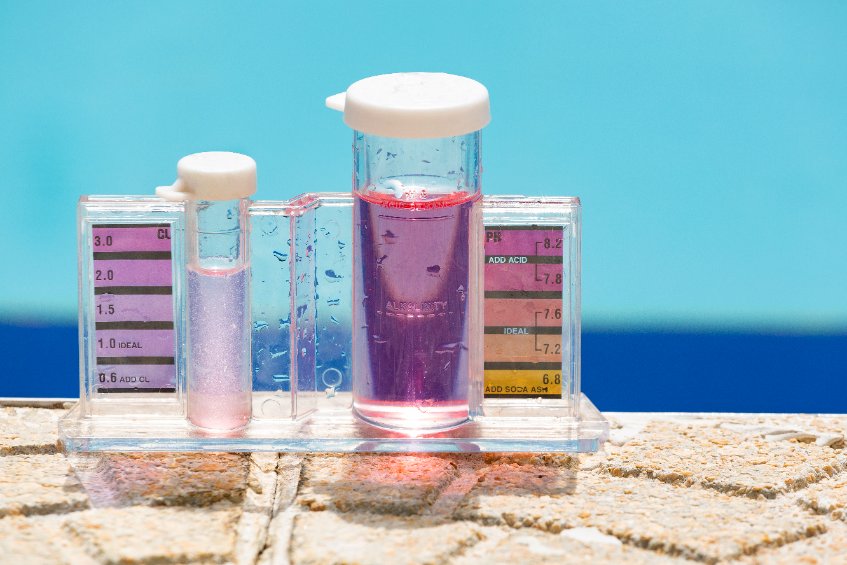The Importance of Routine Pool Water Testing
A variety of factors – from storms and debris to other external environmental conditions – have a significant impact on a pool’s water quality. When it comes to chemical levels like chlorine and pH, weekly water testing is essential for maintaining a clean, safe, and damage-free pool environment.
Benefits of Regular Pool Water Testing
Water chemistry testing is a key part of swimming pool maintenance. Unfortunately, many pool owners don’t realize just HOW many benefits they will see when they keep regular tabs on their pool water chemistry and quality. Below, we’ve listed the major benefits.
- • Protect the health of swimmers: Unmonitored pool water is a breeding ground for harmful bacteria and pathogens. Not only that, but water without a balanced pH can be a safety hazard. If your pool water is too acidic or alkaline, it can irritate swimmers’ skin and eyes, dry out skin and hair, or even create a stinging effect.
- • Prevent pool damage: Not only does unbalanced pool water affect human health, but it can also weaken the structure of your pool, making it susceptible to greater damage. If your pool water isn’t adjusted on a regular basis, you will quickly see both cosmetic damages AND serious pool system malfunctions.
Water with a low pH causes calcium build-up and scaling on pool walls, floors, piping, valves, filters, and pumps. Meanwhile corrosive water – with a higher pH – can gradually deteriorate your filtration systems and pumps, as well as pool plaster, fiberglass shells, and protective coatings. By testing pH levels with the Rising Sun Pools water testing app, you can determine whether your water is corrosive or scaling and stay ahead of these problems.
- • Extend the life of your pool: Swimming pools are big investments – too expensive to have to repair on a yearly basis. Nevertheless, long-term exposure to scaling and corrosive pool water can lead to total failure of your pool system. To keep your pool around for years to come, it’s best to do weekly check-ups on your pool water – assessing factors like pH, chlorine, and stabilizer.
- • Create a comfortable swimming environment: Your pool should be a fun, relaxing oasis for your family and friends to enjoy…not a place you want to avoid. Even the slightest increase or decrease of certain chemicals can make your pool uncomfortable for swimmers. While acidic water can cause your eyes to sting and become extra bloodshot, water with excess chlorine or bromine can leave you with a nagging itchiness across your skin.
- • Save money: Similar to a car, regular swimming pool check-ups can prevent larger system breakdowns down the road – issues that become very expensive very quickly. Even if you don’t SEE any exterior damage, unhealthy water will slowly rust and degrade your pool equipment. Then, you’ll “suddenly” have your Rising Sun Pool service team on speed dial.
Not only do semi-regular pool repairs become expensive, but they also make owning a pool a LOT less fun. More often than not, homeowners feel overwhelmed by their pools simply because they haven’t tested their water enough.
What Pool Chemicals Should You Check & How Often?
Adjusting pool chemicals is something of an art. It can be challenging to determine precisely how much of a chemical you should add and how often. To help you out, we’ve listed our recommended levels and testing frequency for some of the most prominent pool chemicals.
- • Total Alkalinity: 80 to 120 ppm; Test weekly. (The stability of this test influences pH levels.)
- • pH: 7.2 to 7.8; Test 2 to 3 times each week. (Maintaining a balanced pH keeps your chlorine at its highest level of effectiveness.)
- • Chlorine: 2.0 to 3.0 ppm; Test 2 to 3 times each week. (Testing free chlorine helps determine the sanitizing abilities of your water and protects the water against toxic environmental conditions.)
- • Stabilizer (cyanuric acid): 20 to 50 ppm; Test weekly. (Only add if levels fall below 30 ppm.)
- • Calcium Hardness: 100 to 300 ppm for fiberglass / 200 to 400 ppm for vinyl and concrete; Test monthly. (Unbalanced calcium levels can have a wide range of effects on your pool – from heater inefficiency and cloudy water to pitted concrete surfaces and dissolved concrete and grout.)
- • Metals (copper, iron, & manganese): Level depends on metal type; Test every 3 to 4 months. (Creating a staining effect, metals in your water should be removed as soon as detected.)
How to Test Pool Water Accurately
Without proper water testing, any kind of pool chemical treatment would be guesswork. Fortunately, we’ve created an easy-to-use water testing app to help you make sure you’re treating your pool correctly. Navigate to the Rising Sun Pools water testing web app to receive recommended dosages and treatments for your pool.
Want a Rising Sun Pools professional to handle the testing? Pool water testing is available in all three of our stores.
Rising Sun Pools – Pool Maintenance Services in Raleigh, NC
For certain pool damage, the proper water testing discipline can come too little too late. Fortunately, Rising Sun Pools not only BUILDS stunning in-ground and above-ground swimming pools across Raleigh, North Carolina. We also take all the necessary steps to MAINTAIN your spectacular pool for generations to come.
Need our expert pool maintenance? Check out our Pool Services now.
RELATED:
Avoid Damage to Your Pool With These Tips
Rising Sun Pools Goes Beyond Pool Installation: Our Raleigh Pool Service
Tips For Maintaining a Healthy Swimming Pool

